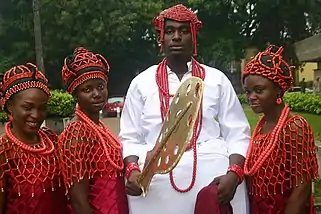Edo people
The Edo or Benin people is an ethnic group primarily found in Edo State, Nigeria. They speak the Edo language and are the descendants of the founders of the Benin Empire. They are closely related to other ethnic groups that speak Edoid languages, such as the Esan, the Afemai, the Isoko and the Urhobo.
Edo | |
|---|---|
 An Edo children's cultural assembly | |
| Total population | |
| 2 million+[1] | |
| Regions with significant populations | |
| southern Nigeria Niger Delta | |
| Languages | |
| Edo language | |
| Religion | |
| Predominantly Christianity | |
| Related ethnic groups | |
| Afemai, Esan, Isoko, Urhobo |
The name "Benin" (and "Bini") is a Portuguese corruption, ultimately from the word "Ubinu", which came into use during the reign of Oba (ruler) Ewuare the Great, c. 1440. "Ubinu", a Yoruba word meaning vexation, was used to describe the royal administrative centre or city or capital proper of the kingdom, Edo. Ubinu was later corrupted to Bini by the mixed ethnicities living together at the centre; and further corrupted to Benin around 1485 when the Portuguese began trade relations with Oba Ewuare.[2]
History

Administrative Region
Edo people can be found in Nigeria's Edo State which got its name from the primary inhabitants of the region's most notable historical conglomeration, Benin City, which is also the central capital homeland of the Edo people. Edo people also have many related groups in their immediate surroundings also encompassed by the political and administrative borders of Edo state. Most of these groups have traced their history back to the historical city center off the Benin people, Benin City. Examples of such adjacent groups include various Afemai sub-groups, the Esan people of Edo state and the Akoko Edo people situated on the state's northern borders.
Edo state was formerly part of the old Bendel state of early post-colonial Nigeria, also known as the Mid-Western Region, Nigeria. This region's influence and culture reflects that of the Edo, Urhobo, Esan and other Edo related peoples.



Dressing
Edo people have one of the richest dress cultures on the African continent. Their fashion accessories holds royalty and typically includes red beads, body marks, bangles, anklets, raffia work and so on.[3]
Traditional beliefs
In the traditional religion of the Edo, there exists, besides the human world, an invisible world of supernatural beings acting as interceders for the human world. Offerings are made to them in their respective shrines. Osanobua is the creator and Supreme God. His son/daughter Olokun is ruler of all bodies of water and is responsible for the prosperity and fertility of his/her human followers. Another son Ogun, is the patron god of metalworkers. The epithet Osanobua Noghodua mean God Almighty. The word Osanobua encompasses a large number of divine principles - including the divine state of being merciful, timeless, goodness, justice, sublimity, and supreme. In the Edo belief system, Osanobua has the divine attributes of omnipresence (orhiole), omniscience (ajoana), and omnipotence (udazi). The Supreme Deity is believed to be present everywhere and at all times.[4][5]
.jpg.webp)
Art and architecture
.jpg.webp)
Traditional Edo art consists of widely identifiable sculptures, plaques and masks which reflect various spiritual and historical aspects of their rich cultural traditions. Some of the most notable Edo art pieces include the mask of the Queen Mother Idia and a vast collection of historical Edo art pieces called the Benin Bronzes which can be found not only in Nigeria but further dispersed around the world.
Notable Benins in Nigeria
- Victor Uwaifo, musician, writer, sculptor, and musical instrument inventor.
- Peter Odemwingie, professional footballer.
- Charles Novia, film director, producer, screenwriter, actor and social commentator.african l
- Osayuki Godwin Oshodin, former Vice-chancellor of University of Benin.
- Benson Idahosa, evangelist, and founder of the Church of God Mission International.
- Samuel Ogbemudia, politician and former military Governor of the Mid-West State
- John Odigie Oyegun, politician and first national chairman of All Progressives Congress (APC) in Nigeria
- Victor Ikpeba, professional footballer.
- Godwin Obaseki, governor of Edo state and business man
- Gabriel Igbinedion, Nigeria business man and esama of Benin kingdom.
- Erhabor Emokpae, artist
- Guosa Alex Guosa Igbineweka, Guosa Language Evolutionist, Creator: a Nigerian and ECOWAS indigenous zonal lingua-franca
- Abel Guobadia, former Chairman of Nigeria's Independent National Electoral Commission
- Professor Osasere Orumwense, Vice-Chancellor of University of Benin
- Suyi Davies Okungbowa, African fantasy and speculative fiction author
- Archbishop John Edokpolo, Honourable Minister of Trade and Founder of Edokpolor Grammar School
- Chief Jacob U. Egharevba, a Bini historian and traditional chief
- Rema, music artist
Icons
References
- Shoup III, John A. (2011). Ethnic Groups of Africa and the Middle East: An Encyclopedia: An Encyclopedia. ABC-CLIO. p. 130. ISBN 9781598843637.
- "Yoruba leaders disagree over origin, meaning of their name". Vanguard News. 2019-10-26. Retrieved 2021-02-03.
- Okpokunu, Edoja; Agbontaen‐Eghafona, Kokunre A.; Ojo, Pat O. (2005). "Benin dressing in contemporary Nigeria: social change and the crisis of cultural identity". African Identities. 3 (2): 155–170. doi:10.1080/14725840500235506. S2CID 143668454.
- Peavy, Daryl, Kings, Magic, and Medicine, p. 5, ISBN 9780557183708
- Paula Ben-Amos, Flora Edouwaye S. Kaplan: Edo Religion. In: Lindsay Jones: Encyclopedia of Religion. Thomson-Gale, 2005. ISBN 002865997X
External links
- Cultural Wars and National Identity - The Saga of the Yoruba and the Bini-Edo
- Bini Names in Nigeria and Georgia
- Edoworld -The origin of Edo/Bini people
- Who are the Edos/Binis?{source Edoworld}
- Nature of God in Edo Religion
- Royal Art of Benin: The Perls Collection, an exhibition catalog from The Metropolitan Museum of Art (fully available online as PDF), which contains material on the Edo people